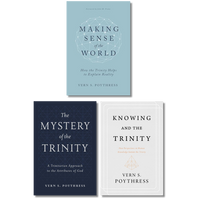
Poythress, Vern S.
Description
Starting with the doctrine of the Trinity, Vern Poythress addresses six challenges concerning the compatibility of God’s independence with his activities in the world. The eternal activities among the persons of the Trinity offer a foundation for God’s activities in the world. Alternative metaphysical frameworks for explaining God’s transcendence and immanence run the danger of overriding the truths of biblical revelation.
Contents
Foreword by Sinclair B. Ferguson
Introduction: God’s Attributes and the Trinity
Part 1: Beginning to Consider God
1. Resources
2. Knowing God
Part 2: Classical Christian Theism
3. Attributes of God: Absoluteness
4. Infinity
5. Immensity (Omnipresence)
6. Eternity
7. Immutability (Unchangeability)
8. God’s Knowledge (Omniscience)
9. The Simplicity of God
Part 3: The Trinity – Mysteries in Diversity
10. The Mystery of the Trinity
11. Coinherence
12. Trinitarian Action Revealing God
Part 4: The Trinity and Language
13. The Origin of Language
14. God and Anthropomorphism
15. An Example: Dealing with Regretting
16. God and Creaturely Language
17. God and Technical Language
18. The Value of Technical Terms
Part 5: Philosophical Conundrums
19. Abstract Terms from Philosophy
20. Substance in Philosophy
21. Aristole’s Categories
22. Form and Matter
23. Essence
24. Technical Terms for the Trinity
Part 6: Challenges in Classical Christian Theism
25. Aristole’s Unmoved Mover
26. Attributes of God in Thomas Aquinas
27. The Trinity in Aquinas
28. Aquinas’s Avoidance of Disaster
29. Attributes in the Reformers
30. Attributes in Francis Turretin
31. The Trinity and Attributes
32. The Trinitarian Structure of Predication
33. Attributes in Stephen Charnock
34. Charnock’s Answers to Objections
Part 7: Dealing with Challenges
35. Avoiding Dangers in Thinking
36. The Issue of New Relation
37. The Boundary between God and Man
38. The Central Challenge in Describing God
39. Making a Step
40. God’s Responding
41. Interpreting Passages about God’s Responses
42. Presuppositional Arguments
43. Identity and Distinction in God
Part 8: Some Attributes in the Light of the Trinity
44. The Love of God
45. The Mercy of God
46. The Will of God
47. The Knowledge of God
48. A Summary
What It May Take: A Personal Reflection
Appendix A: Issues in the Controversy
Appendix B: Suggestions for Classical Christian Theists
Appendix C: Suggestions for Christian Personalists
Appendix D: Can We Know the Essence of God?
Appendix E: The Meaning of Accommodation
Endorsements
“This book is a valiant and thought-provoking attempt to approach the attributes of God through the doctrine of the Trinity. . . . While broadly endorsing the classical doctrine of God, [Poythress] is suspicious of our reliance on well-defined technical terms that are required to do our work for us. He wants us to abandon our implicit reliance on Aristotelian metaphysics in favor of the shaping power of the mystery of the Trinity. . . . In the hands of Poythress, this becomes an appeal to become more robustly biblical, not less. This book is truly transforming—a capstone to all that Vern Poythress has taught us over the last two or three decades. Read it slowly and carefully.”
—D. A. Carson, Emeritus Professor of New Testament, Trinity Evangelical Divinity School
“The Mystery of the Trinity is unique among treatments of the doctrine of God because of the way that Vern Poythress approaches God’s attributes through the Trinity, Christ’s resurrection, and philosophical analysis of other theological approaches. Poythress does not have all the answers to the controversy between classic Christian orthodoxy and modern modifications of the view of God (and does not claim to), but his book will certainly stir up edifying reflection and conversation, and he is a model of theological contemplation and gentleness.”
—Joel R. Beeke, President, Puritan Reformed Theological Seminary
“Dr. Poythress applies his deep knowledge of Scripture, his well-informed knowledge of historical theology, and his brilliant mind to some of the most difficult controversies in the theology of the divine attributes.”
—Philip Graham Ryken, President, Wheaton College
“A stimulating and fascinating book. . . . Poythress raises important questions that need addressing and offers many incisive and challenging insights.”
—Robert Letham, Professor of Systematic and Historical Theology, Union School of Theology
“The challenge for our speaking about who God is . . . is to speak of the sublimely majestic mysteries involved in a biblically bounded way. . . . In this volume, Dr. Poythress meets this challenge in an exemplary and most helpful way. I commend it.”
—Richard B. Gaffin Jr., Professor of Biblical and Systematic Theology, Emeritus, Westminster Theological Seminary
“I enthusiastically recommend The Mystery of the Trinity as by far the best account of these issues.”
—John M. Frame, Professor of Systematic Theology and Philosophy Emeritus, Reformed Theological Seminary
“Thoughtful, pastoral, and meticulously exegetical. There is no topic more important than the doctrine of God. Those who want to know him better will be richly rewarded by reading this book.”
—Chad Van Dixhoorn, Professor of Church History, Westminster Theological Seminary
“A monumental achievement. . . . [Vern Poythress] unites doctrine with praise, content with personal knowledge, theory with pastoral practicality. Above all, the reflections are thoroughly and richly scriptural. . . . If given the right kind of regard, this book will be life-changing.”
—William Edgar, Professor of Apologetics, Westminster Theological Seminary
About the Author
Vern S. Poythress (MLitt, University of Cambridge; PhD, Harvard University; DTh, University of Stellenbosch, South Africa) is distinguished professor of New Testament, biblical interpretation, and systematic theology at Westminster Theological Seminary in Philadelphia. He has authored books on a wide range of topics.